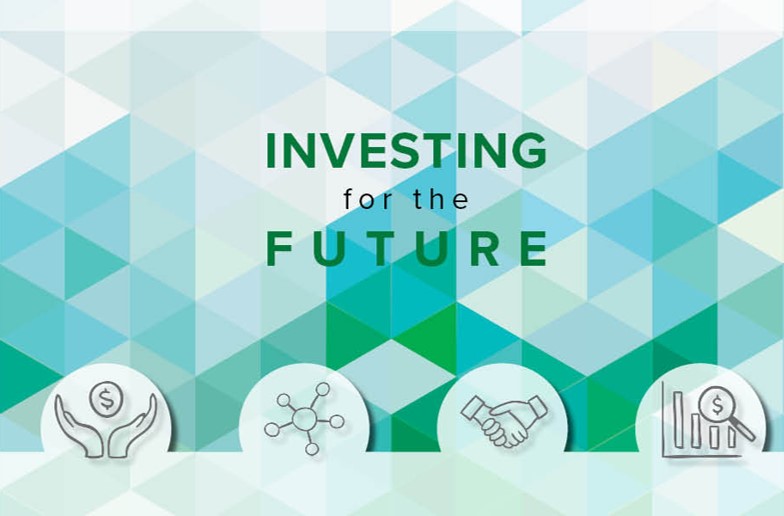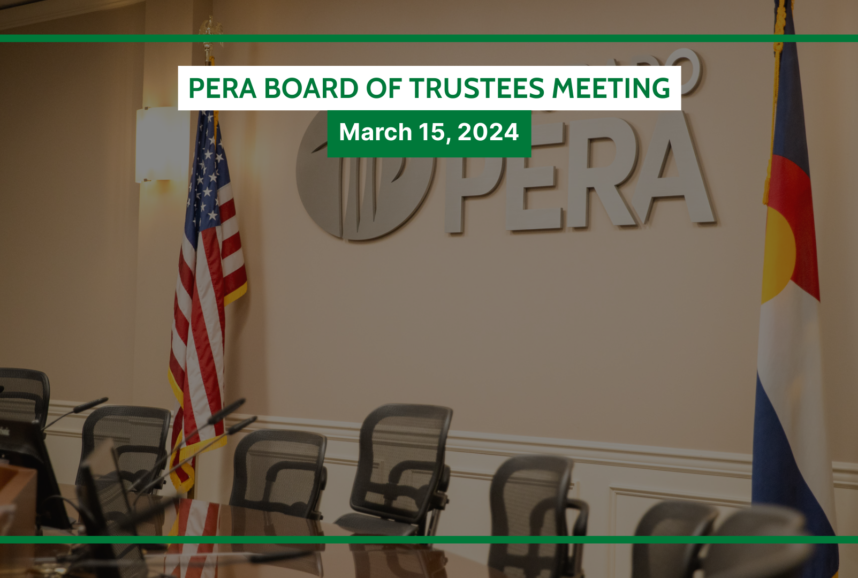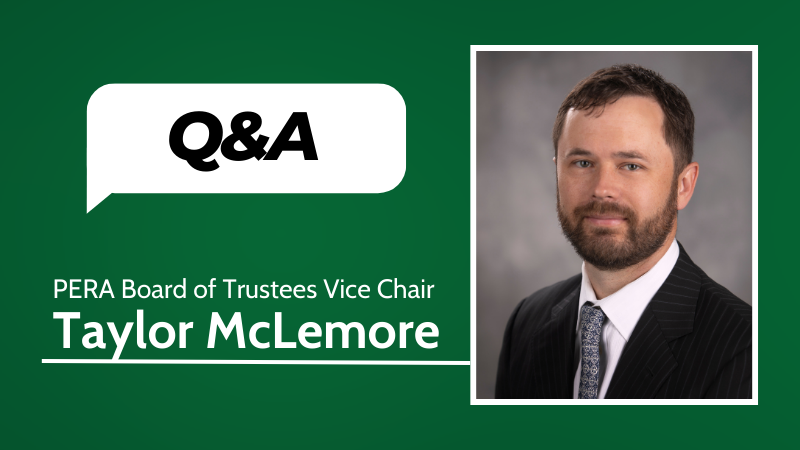Colorado PERA’s 2019 Investment stewardship Report, released earlier this summer, documents how PERA’s investment stewardship – including cost-conscious investment strategies – protects the plan’s long-term financial sustainability and preserves the value of contributions to the plan for decades.
With today’s active members retiring a full generation into the future, PERA must protect and preserve the value of its investment fund over a long time horizon. This means focusing on the long-term profitability of the companies in which it invests, rather than seeking quick, short-term returns.
To enhance the long-term sustainability of its investments, PERA values firms and partnerships that have adaptive business models, making them well-positioned for continued profitability over the long term. PERA considers relevant issues in investment decisions, which may include environmental, social, and governance (ESG) factors.
When evaluating public investment opportunities or private investment properties and managers, PERA investment staff may consider environmental stewardship factors that are material to profitability. Staff have found financial value in some companies, properties, and partnerships that integrate relevant environmentally sustainable practices in their business models:
- PERA’s timberland manager is committed to responsible natural resource management, including providing investment returns on wood fiber products while protecting ecological and social quality, such as forests, watersheds, threatened species, and biodiversity. Through those efforts, the manager has preserved 460,000 acres of sensitive lands and sold 4.1 million tonnes of carbon credits.
- PERA’s real estate portfolio includes over three million square feet of directly owned properties that have earned the ENERGY STAR® designation, which ranks PERA’s certified buildings in the top quartile of peer buildings nationwide, based on energy efficiency metrics, according to the U.S. Environmental Protection Agency. PERA also directly owns 635,393 square feet of LEED-certified property, as awarded by the LEED® green building program.
- Through private equity and debt investments, underlying companies in which PERA invests include producers and suppliers of eco-friendly energy including solar, wind, geothermal, and hydro-powered energy production. Other firms develop low-cost technologies used to produce biofuels by converting municipal solid waste and biomass into green chemicals.
PERA also takes pride in its contributions to Colorado’s economy, including direct investments in Colorado companies, employing hundreds of local employees and providing retirement income for thousands of Colorado retirees.
- As of December 31, 2018, PERA had more than $566 million in Colorado investments, including both public and private equity of companies headquartered in Colorado, bonds issued by the Colorado Housing and Finance Authority and Colorado real estate – both direct ownership and pooled investment capital.
- PERA employs more than 300 Colorado residents and pays retirement benefits to more than 121,000 retired public employees and beneficiaries.
PERA also encourages the companies in which it invests to adopt strong corporate governance practices by exercising its shareholder voting rights by proxy.
[Read more about PERA’s proxy voting here.]As a shareholder of public companies, PERA has the right to vote on important governance issues, such as separating the chairman and CEO roles within a firm and declassified corporate board structures that require members of governing boards to re-run for election every year. Exercising that right is part of PERA’s fiduciary duty to its members and beneficiaries.
PERA views its shareholder rights as a means to encourage positive direction in the oversight of the companies in which it invests. Conversely, divestment would limit PERA’s influence over issues of corporate governance because it would eliminate PERA’s shareholder voting rights from those firms which it could no longer consider for investment.
Divestment, or withholding investments from firms that do not adhere to a prescribed set of values, is one approach to screening for environmental, social and governance factors in investment decisions. At the opposite end of the spectrum is impact investing, or specifically directing investments to firms that adhere to a specific set of values. However, neither of those approaches would suit the objectives of all 600,000 individuals who rely on PERA for their retirement security. Simply put, PERA cannot invest in a way that meets the personal beliefs of each member. And such an approach would not fulfill PERA’s fiduciary responsibility to preserve the long-term sustainability of the PERA Fund for its members and retirees.
As the PERA Board of Trustees explains in its Statement on divestment, updated in January, 2019, “PERA will implement the divestment mandates passed by the Colorado General Assembly but would recommend the legislature thoughtfully consider such proposals with caution and fiduciary care.” Instead, PERA invests according to strong financial diligence, evaluating its investments for their potential for continued profitability over the long term.
Members who are interested in investing in alignment with personal values of environmental and social sustainability have the option to invest their own savings in the PERAdvantage SRI Fund. This fund combines performance objectives with a focus on sustainability and is available through the PERAPlus 401(k) and 457 voluntary retirement savings plans, as well as the Defined Contribution (DC) plan.
Considering relevant factors in its investment decisions is another critical component of PERA’s investment stewardship philosophy. More on PERA’s four-part stewardship approach is available here.
StewardshipThe practice of overseeing or managing something entrusted to one’s care. PERA’s approach to investment stewardship is focused on ensuring the financial sustainability of the fund that pays benefits to retirees and beneficiaries.StewardshipThe practice of overseeing or managing something entrusted to one’s care. PERA’s approach to investment stewardship is focused on ensuring the financial sustainability of the fund that pays benefits to retirees and beneficiaries.StewardshipThe practice of overseeing or managing something entrusted to one’s care. PERA’s approach to investment stewardship is focused on ensuring the financial sustainability of the fund that pays benefits to retirees and beneficiaries.Proxy votingThe process by which shareholders can vote on corporate proposals without being present at a shareholder meeting.FiduciaryA person who manages money on someone else’s behalf and who has a sworn responsibility to manage those funds in the best interest of the client. EsgAcronym for environmental, social, and corporate governance factors that can be used when making investment decisions.DivestmentThe act of selling one’s investments in a particular company or sector, often for philosophical or political reasons.DivestmentThe act of selling one’s investments in a particular company or sector, often for philosophical or political reasons.DivestmentThe act of selling one’s investments in a particular company or sector, often for philosophical or political reasons.Defined contributionA type of individual retirement plan in which an employee saves a portion of each paycheck (along with a potential employer match) and invests that money. The employee’s retirement benefit is based on their account balance at retirement. A 401(k) is a type of defined contribution plan.Private equityA type of investment in which investors purchase shares of a company that is not traded on a public stock exchange.





PERA should not be making investment decisions based upon “political correctness”. This is why PERA lost money last year when every other investor made 15-20% returns.
PERA needs to use common sense and apply fiduciary standards to every investment decisions made.
Dear Ms. Kerstann,
Thank you for your comment. For clarification, please see PERA’s Statement of Investment Policy here: https://www.copera.org/sites/default/files/documents/investmentpolicy.pdf, as well as the Board of Trustees’ Statement on Divestment: https://www.copera.org/sites/default/files/documents/divestment.pdf
The value of PERA’s investment portfolio declined during calendar year 2018 because the financial markets declined. Global equities, as measured by the MSCI ACWI, declined 9.4 percent in 2018, while the Bloomberg Barclays U.S. Aggregate Bond index was flat for the year. (Recall that at the end of 2017, the PERA portfolio returned 18.1 percent.) The 10-year annualized rate of return was 8.8 percent at the end of 2018. The PERA portfolio is structured to balance risk and return over many decades.
PERA investment should be based solely on sound financial considerations. This may or may not have social, ecological, considerations. But the number 1 goal should be financial growth and stability for the sake of the members, nothing else. To allow any other considerations to direct financial direction on behalf of the PERA membership is not responsible.
Ms Kerstann,
Thank you for your comment … you are correct!
PERA should not be making investment decisions based upon “political correctness”.
PERA should be much more conservative: invest much more in fixed income than equities. Long-term investing should consider the adage: tortoise vs hare; and NOT ESG!
PERA should not gamble PERA funds on equities.
See link below.
https://www.pbs.org/wgbh/frontline/film/the-pension-gamble/